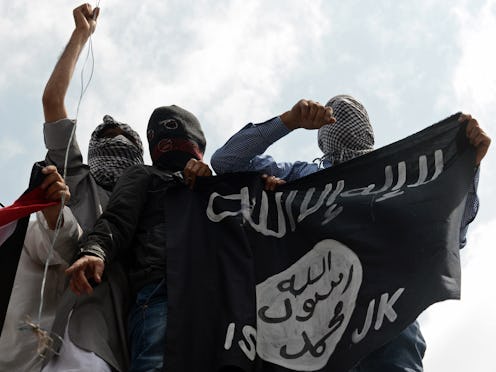News
Mixed Reactions To Execution Of Japanese Hostage
Following the release of a graphic video purporting the execution of Japanese citizen Haruna Yukawa, global leaders have come together to denounce the latest act of violence at the hands of ISIS, the terrorist organization that has displayed the depths of human depravity over the course of the last year. In the latest video, Japanese war correspondent Kenji Goto holds a photo showing the body of the allegedly executed contractor Yukawa. Placing a phone call to Japan from India, where he recently arrived for a three-day visit, President Obama offered his condolences and support to Japanese Prime Minister Shinzo Abe. In a statement, Obama further noted, "The United States strongly condemns the brutal murder of Japanese citizen Haruna Yukawa by the terrorist group ISIL. Our condolences today are with the people of Japan for their terrible loss."
This most recent act of violence has, once again, shaken the international community to its core, as ISIS continues to carry out acts of international terrorism seemingly without repercussion or foreseeable end. Prime Minister Abe said Sunday morning that he was left "speechless" by the inhumanity displayed by the militant organization, and emphasized the Japanese government's condemnation of terrorism. Abe also offered his sympathies towards Yukawa's family and friends, some of whom still maintained hope that the video was a hoax, and that they could soon be reunited.
Calling the acts "outrageous and unforgivable," Abe was joined by numerous heads of states whose own countrymen have been affected by ISIS terrorism, many of whom urged the Japanese government not to pay the $200 million ransom initially demanded for the release of the two men. Said Obama,
We stand shoulder to shoulder with our ally Japan and applaud its commitment to peace and development in a region far from its shores. We will work together to bring the perpetrators of these murders to justice and will continue to take decisive action to degrade and ultimately defeat ISIL (ISIS).
British Prime Minister David Cameron also denounced the video and its purported message, calling it yet "another reminder of the murderous barbarity of these terrorists." Cameron further noted that the United Kingdom "stands in solidarity with the Japanese people," as the militants also beheaded British national Alan Henning last October.
French President Francois Hollande added his voice, asserting that France "strongly condemned the barbaric murder" and lauding Japan's "determined engagement in the fight against international terrorism." But despite Hollande's praise of Abe and Japan's actions against ISIS, some Japanese citizens are less than pleased with their government's response to the terrorist threat, blaming Abe for inciting the situation himself. Japan, which has largely remained uninvolved in international disputes following World War II, has managed to stay out of the international spotlight in terms of conflict and violence, a position that seems popular with most Japanese nationals. But Abe's continued involvement in contentious international politics is now being viewed as motivation for ISIS' anger.
At a protest following the announcement of the hostage's alleged death, demonstrators expressed their frustrations at the country's abandonment of pacifism, with one individual saying "This happened when Prime Minister Abe was visiting Israel. I think there's a side to this, where they may have taken it as a form of provocation, possibly a big one." Others blamed Abe's supposed over-eagerness in the fight against ISIS as a dangerous insult to the terrorist organization, and seemed staunchly opposed to the expansion of Japan's role in combating the militant group.
Indeed, the reaction at home in Japan has differed vastly from that of American and British citizens following the execution of their compatriots. In a tearful plea for her son's life, Junko Ishido, the mother of Kenji Goto, began her statement by asking forgiveness from the Japanese people, saying "Thank you for your great kindness and I apologize for the tremendous inconvenience and trouble that my son has caused." This sense of duty and humility is one that has characterized Japan for the entirety of its history, explains Jeff Kingston, director of Asian Studies at Temple University's Tokyo to CNN. "In Japan when you inconvenience people, it's important to respect them and ask for forgiveness."
Surprisingly, for many Japanese citizens, the plight of the two hostages was largely brought upon themselves, and previous hostages who have since been rescued have not been met with a hero's welcome, but rather a cold distance. As CNN reports,
In 2004, three young Japanese hostages were released by militants in Iraq. Instead of being welcomed home, they were shunned for "causing trouble" for Japan. The former hostages, including one who was in Iraq helping children before her capture, were even billed by the government for their airfare.
With national philosophies like "self responsibility" and "go at your own risk" deeply ingrained in the national psyche, it is no wonder that the collective response to the hostage situation has been somewhat chillier than that experienced in the United States.
But now, the situation at hand has become markedly different, and the Middle East, once perceived to be a world away by the average Japanese citizen, has become much closer and far more personal. And as Japan continues to join the increasingly necessary international effort to combat ISIS, pacifism is becoming less and less of an option.
Images: Getty Images (4)
